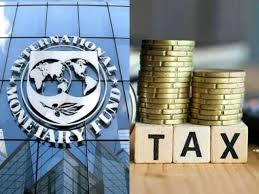Islamabad, May 18, 2025: The International Monetary Fund (IMF) has proposed a bold new tax target of Rs. 14,307 billion for Pakistan’s Federal Board of Revenue (FBR) for the fiscal year 2025-26, representing 10.7% of GDP.
The IMF’s latest review highlights a major policy shift: a proposed legislative bill to eliminate the “non-filer” category, effectively blocking non-taxpayers from purchasing vehicles and property—part of a broader campaign to expand the country’s tax base.
In its first review under the Extended Fund Facility (EFF), the IMF outlines a detailed breakdown of the FBR’s 2025-26 revenue goals.
Direct tax collection is targeted at Rs. 6,470 billion, while sales tax is pegged at Rs. 4,943 billion.
Federal Excise Duty aims for Rs. 1,153 billion, and customs duties are projected to contribute Rs. 1,741 billion.
To further align with environmental sustainability goals, Pakistan has committed to implementing a carbon levy through the upcoming Finance Act.
This levy, to be gradually phased in over two years, will cover gasoline, diesel, and fuel oil—aiming to discourage the use of fossil fuels, particularly internal combustion engine (ICE) vehicles and high-emission fuels in power generation.
Additionally, the current Tajir Dost scheme—which sought to simplify tax payments for retailers—will be replaced with a new income tax framework based on direct collection through the FBR.
Despite its shortcomings, Tajir Dost did contribute to a 51% year-on-year increase in retailer tax filers, and a 38% increase in those with positive tax liabilities as of January 2025.
The IMF report also reflects the government’s agreement to raise overall revenue to 12.3% of GDP in 2024-25, with the FBR’s share expected to hit 10.6% (Rs. 12,332 billion).
To meet this goal, the FBR will double down on compliance risk management (CRM), digital monitoring, and tightening oversight on suspicious sales tax and import patterns.
CRM systems are now operational in major cities like Islamabad, Karachi, and Lahore, and are being extended to corporate tax units.
Read More: Pakistan Under Pressure to Raise Extra Rs. 430 Billion in Taxes
Legal reforms are another cornerstone of the strategy. The government is aggressively pursuing resolution of tax-related litigation cases worth Rs. 367 billion.
A key Supreme Court decision expected by mid-April could unlock Rs. 120 billion in pending revenues.
Economists suggest that removing the non-filer status could be a game-changer. “It’s a structural reform long overdue,” said a senior tax policy expert. “It forces financial accountability and brings high-value transactions under scrutiny.”









